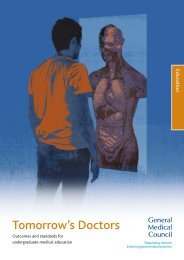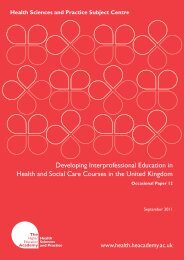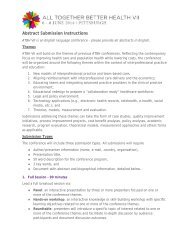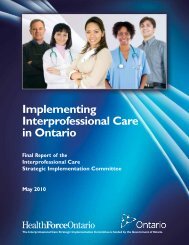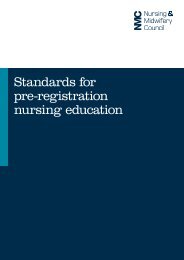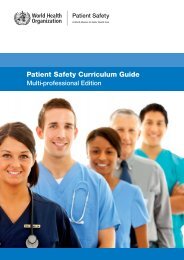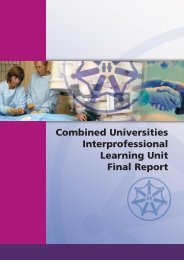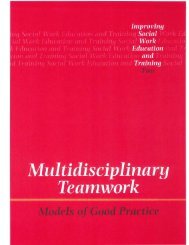Health and Social Care Policy and the Interprofessional ... - CAIPE
Health and Social Care Policy and the Interprofessional ... - CAIPE
Health and Social Care Policy and the Interprofessional ... - CAIPE
Create successful ePaper yourself
Turn your PDF publications into a flip-book with our unique Google optimized e-Paper software.
of opinion that interprofessional, interagency working is <strong>the</strong> only way forward,<br />
Wanless concludes his exploration of <strong>the</strong> workforce issues by commenting<br />
‘although <strong>the</strong> number of health care professionals is important for <strong>the</strong> capacity<br />
of <strong>the</strong> system, arguably <strong>the</strong> way <strong>the</strong> workforce is used is even more important’<br />
(ibid: 204).<br />
The Kennedy Report<br />
In 2001 perhaps <strong>the</strong> most significant <strong>and</strong> far-reaching Inquiry into <strong>the</strong> way <strong>the</strong><br />
systems can fail to protect <strong>the</strong> community it purports to serve was published<br />
(DH, 2001c). Commissioned by <strong>the</strong> <strong>the</strong>n Secretary of State in 1998 <strong>the</strong><br />
Inquiry took three years to complete. Generally referred to as <strong>the</strong> Kennedy<br />
Report, it focuses on <strong>the</strong> poor quality of children’s heart surgery <strong>and</strong> its<br />
consequent high mortality rates at Bristol Royal Infirmary between 1984 <strong>and</strong><br />
1995. The Report acts as a wake up call for all <strong>and</strong> was subsequently<br />
described by <strong>the</strong> Government as ‘a turning point in <strong>the</strong> history of <strong>the</strong> NHS’<br />
(ibid: 13). The Inquiry was wide ranging <strong>and</strong> far reaching, with <strong>the</strong> <strong>the</strong>n<br />
Secretary of State, Alan Milburn observing in his foreword that ‘<strong>the</strong> Report<br />
provides a powerful analysis of <strong>the</strong> flaws <strong>and</strong> failures of <strong>the</strong> organisation <strong>and</strong><br />
culture, not only at <strong>the</strong> BRI in <strong>the</strong> years in question, but of <strong>the</strong> wider NHS at<br />
that time’. Kennedy <strong>and</strong> his team made 198 recommendations, most of which<br />
were accepted unreservedly by <strong>the</strong> Government <strong>and</strong> were implemented as<br />
quickly as possible.<br />
A number of <strong>the</strong>se recommendations can only be achieved through truly<br />
interprofessional, interagency practise an example being No19 which states<br />
‘<strong>Health</strong>care professionals responsible for <strong>the</strong> care of any particular patient<br />
must communicate effectively with each o<strong>the</strong>r. The aim must be to avoid<br />
giving <strong>the</strong> patient conflicting advice <strong>and</strong> information’ (ibid: 439).<br />
The Government’s response to this is also worth quoting in full: ‘We agree.<br />
Our communications initiative will ensure patients are at <strong>the</strong> centre of care<br />
<strong>and</strong> <strong>the</strong> focus of team working <strong>and</strong> interprofessional care. <strong>Health</strong> care<br />
professionals will develop <strong>the</strong>se skills through joint learning <strong>and</strong> working at all<br />
levels of <strong>the</strong> NHS (DH 2002a: 138).<br />
Recommendations 57, 58, 59, 60 <strong>and</strong> 61 of <strong>the</strong> Government’s response to <strong>the</strong><br />
Kennedy Report continue in similar vein with references being made to <strong>the</strong><br />
need for ‘shared learning across professional boundaries’ (57) a call for core<br />
competences in non-clinical aspects of care to be learned ‘as part of a<br />
common learning approach across professions’ (58) with a particular<br />
emphasis being made on communications skills which <strong>the</strong> Government<br />
accepts as ‘a core feature of professional training’ (59) which would be<br />
addressed in a new initiative encompassing all NHS staff. To reinforce <strong>the</strong><br />
importance placed on communication skills, Recommendations 60 <strong>and</strong> 61 are<br />
explicit ‘communication skills must also include <strong>the</strong> ability to engage with <strong>and</strong><br />
respect <strong>the</strong> views of fellow healthcare professionals’ (60) with <strong>the</strong><br />
acknowledgement that ‘<strong>the</strong> education, training <strong>and</strong> continuing professional<br />
development of all healthcare professionals should include joint courses<br />
between <strong>the</strong> professions’ (61)<br />
36




